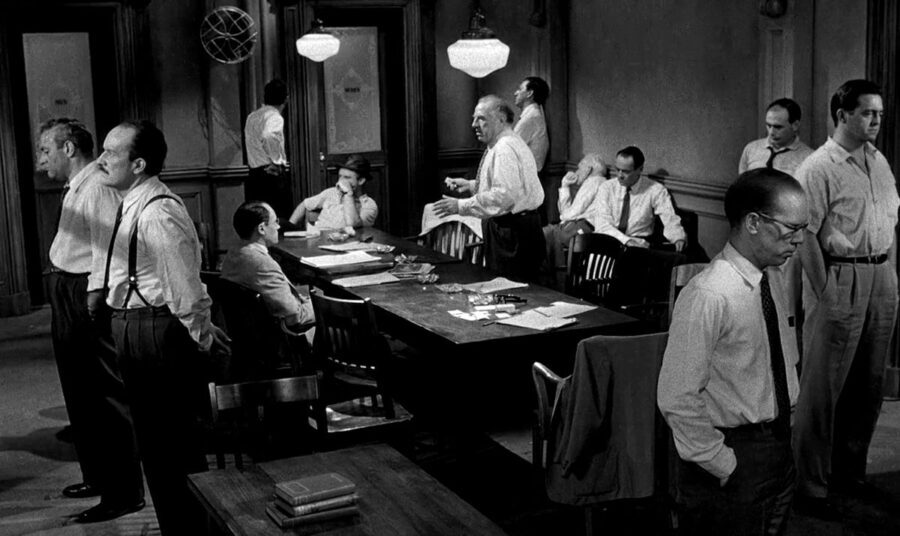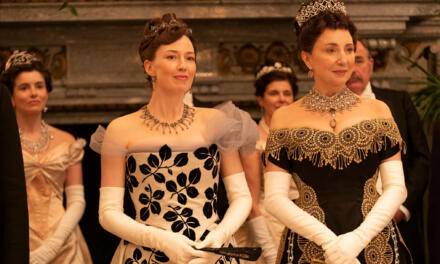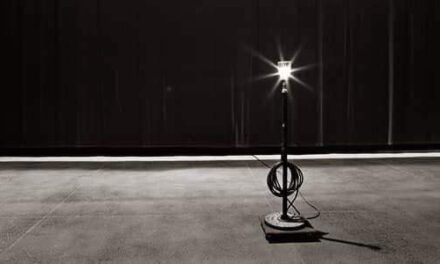Running Sept. 11 to Oct. 4, this production also marks the reopening of Theatre Cocoon following its closure on Feb. 28 due to the government’s state of emergency in response to COVID-19. Posner, 61, has only worked through an interpreter once before when he staged a musical version of Cinderella with a Russian cast in Moscow in 2016. Now add to that the challenge of working long-distance and you’d think the director might be at his wit’s end, but Posner says he welcomes the experience to work with a cast who don’t speak English.
In fact, he cheerfully notes during our video chat, “it’s interesting how you get used to things very quickly.” His enthusiasm also stems from a long-standing desire to stage this work by the socially incisive U.S. writer Reginald Rose. First broadcast as a 60-minute television drama in 1954, Rose rewrote Twelve Angry Men for the stage the following year. However, it was 1957’s Hollywood adaptation, titled 12 Angry Men — which Rose wrote and co-produced with the film’s star, Henry Fonda — that propelled this tale told almost entirely from within a murder trial’s jury room to wide acclaim. It was nominated for three Academy Awards and, in 2008, the American Film Institute selected the film for its second-place spot on a list of the Top 10 greatest U.S. courtroom dramas (behind 1962’s To Kill a Mockingbird starring Gregory Peck and Mary Badham).
The story revolves around 12 male jurors from a wide range of backgrounds who are to deliberate the case of a poverty-stricken 16-year-old boy accused of stabbing his abusive father to death. The judge has instructed the jurors that they must arrive at a unanimous verdict, and if they find him guilty then the teen will receive the death penalty.
At first, it seems the boy’s fate will be sealed quickly as a majority of the jurors — known only by their numbers, one through 12 — agree that he is guilty — all except Juror No. 8 (played in the Tokyo production by Shinichi Tsutsumi), who casts doubt on the prosecutor’s case so effectively that the others start reversing their verdicts one by one. However, it’s not just logic that has a hand in changing the jurors’ minds — but each of the men’s prejudices, assumptions, and lived experiences — with some jurors essentially having breakdowns as they confront their own morals and values.

Take another look: Director Lindsay Posner seeks to create an immersive experience for his cast and the audience with his staging of Twelve Angry Men.
Posner has wanted to stage Twelve Angry Men for a while, but it almost seems like now is a better time than ever to do so.
“I think that politically it implicitly talks about the positive virtues of real justice, democracy, freedom of speech and the freedom to express opinions without prejudice, which is timely today — especially when you look at America, and to an extent Britain and the rest of Europe,” Posner explains.
“And what’s really relevant is the idea that it’s impossible to know the whole truth of an event because you don’t really know the motive for anybody doing anything and there can be multiple interpretations of this. What’s really clever is how this play reveals more about the jurors and their own prejudices than about the trial — meaning they go home having learned something about their own lives and their values. Hopefully, too, our audiences may reflect on how their own prejudices affect their perceptions.”
In practice, the director says he and the cast only talked generally about U.S. society and such themes during the rehearsals.
“As the actors are effectively living inside the play, what’s been more valuable is that they spent a whole week going through it line by line examining the psychological motives and character of each juror,” he says.
Posner says his aim is to immerse both the actors and audiences in the drama as much as possible. In order to create that experience for the audience, he has chosen to position an island-style stage in the middle of Theatre Cocoon’s 747-seat auditorium and performance space.
“It’s about 12 men trapped in a very claustrophobic atmosphere,” he says.
“So I thought if we could wrap the audiences around them, it would add to that pressure and also create a more intense atmosphere among the audiences as they feel more intimately involved. We’ve also kept to the period with 1950s costumes because the play is very time-specific, though the theme remains very modern. And we’re not using much music because it’s the language that is so important. We let the debate and dialogue be (the play’s) most powerful element.”
Luckily, thanks to the clever use of cameras and digital techniques available at Theatre Cocoon, Posner says that he was able to “access so many views into the rehearsal room very clearly that it’s not been so different from directing a film — though there are obviously difficulties.” The most prominent of those difficulties is the physical distance from his cast and staff.
“We are still a bit compromised by me not being physically with the actors,” he says. “There is not the same sharing of sensual creative energy as usual. Also, it necessitates a slightly different way of giving notes because I can’t hand them personally to the actors and the whole company tends to hear.”
The conversation then shifts to the current situation regarding Britain’s response to the novel coronavirus pandemic and Posner points out that many people remain anxious about going out. Adding to that, the finances of large commercial West End venues preclude the theaters from presenting works to socially distanced audiences, though Posner is hopeful for a turnaround in the new year. However, based on his own experience with Twelve Angry Men, Posner is convinced his colleagues at home can “create good theater” even under these unique circumstances — as he aims to demonstrate. He also hopes to send a message of hope to people who work in theater, urging them not to stop staging live works no matter how difficult that may be.
Posner has made the most of the situation by working remotely, but when asked if there would be a more permanent shift to home-based work due to the effects of the pandemic, he firmly declares that will not happen in theater.
“Once we get the virus under control and have a vaccine, I don’t think the form of making theater will change because there is nothing, neither remote or anything else, to replace live rehearsals and staging,” he says. “In the meantime, with a bit of invention and resolve, we can still create very good productions, and it’s vital for theater culture that we don’t stop doing it.”
This article was originally posted in The Japan Times on September 11, 2020, and has been reposted with permission. To read the original article, click here.
This post was written by the author in their personal capacity.The opinions expressed in this article are the author’s own and do not reflect the view of The Theatre Times, their staff or collaborators.
This post was written by Nobuko Tanaka.
The views expressed here belong to the author and do not necessarily reflect our views and opinions.


















